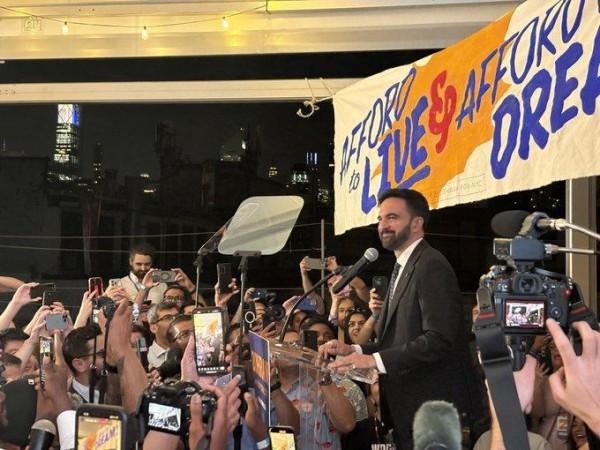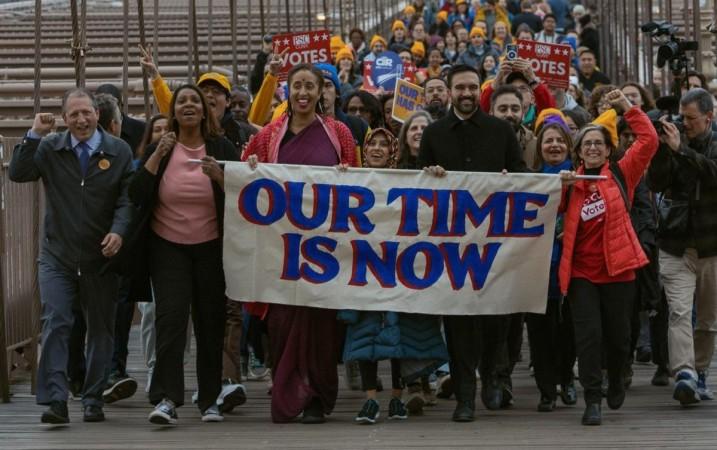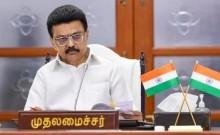
Last week, the voters of New York handed the keys to the world's richest city to a 34-year-old immigrant. In an election that drew more than two million voters, the city's highest turnout since 1969, New Yorkers chose Zohran Mamdani, the son of acclaimed Indian American filmmaker Mira Nair and Columbia University scholar Mahmood Mamdani, as their next mayor.
Mamdani's victory over former New York Governor Andrew Cuomo, who ran as an independent after losing to him in the Democratic primary, is nothing short of a political earthquake. His triumph marks several firsts: he is set to become the youngest mayor of New York in more than a century, and the first Indian American as well as the first Muslim American to lead the city.
How did an obscure state assemblyman rise from relative anonymity to capture City Hall, and, in the process, rewrite New York's political playbook?
The answer lies in the issues he campaigned on, his authenticity, outreach, and timing.
Exit polls revealed that Mamdani captured nearly two-thirds of first-time voters, appealing to New Yorkers disillusioned by establishment politics and rising inequality. He ran a campaign that spoke directly to the middle and working classes, to those grappling with inflation, housing insecurity, and soaring living costs, issues that have defined post-pandemic urban life.
Mamdani's political journey began in 2020, when he unseated an incumbent in the Democratic Party primary to win a seat in the New York State Assembly by just over 300 votes. His campaign then, dubbed "Roti and Roses," was both humble and ambitious: it demanded affordable housing, tenant protections, and greater accountability for corporate landlords.
"(Landlords) and corporations have too much power, and tenants and workers don't have enough," he said at the time, a theme that became the backbone of his political philosophy and his rise to the mayor's office.
What distinguishes Mamdani from most contemporary politicians is his refusal to sand down his identity. Born in Kampala, Uganda, to two parents of Indian origin and raised in Queens after his family immigrated to the U.S. when he was seven, Mamdani has never shied away from embracing his roots. He wears his identity not as a liability but as proof of belonging, reaffirming that an immigrant's story is also an American one.
Trump's Second Term
In a political climate where immigrants have been targeted and vilified, especially during President Donald Trump's second term, Mamdani's unapologetic embrace of his immigrant and Muslim identities stood out. His message resonated across the city's five boroughs, which mirror the city's diversity.
During the final mayoral debate, when candidates were asked to greet New Yorkers in another language, Mamdani chose to say "Ni Hao", Mandarin for "hello." The gesture carried weight: it came just a day after a major ICE raid in Chinatown, home to one of the largest Chinese populations outside Asia.
In a city where nearly six in ten residents are foreign-born, and almost half speak a language other than English at home, his empathy felt personal, not performative. And his heart-warming smile and reassuring style gave those residents comfort and a sense of belonging.
Mamdani's victory is symbolically profound. It marks a moment when a city once scarred by 9/11 has elected a Muslim mayor, less than 25 years after the attacks that reshaped New York and global politics. His campaign faced a barrage of race-baiting ads and fearmongering narratives portraying him as a "risk" for the city's safety. Yet, he countered hate with composure, leaning on coalition-building and relentless community engagement.

Although Donald Trump was not on the ballot, this result from the city of his birth serves as a stinging repudiation of Trumpism and its divisive politics. In a last-minute effort, Trump reluctantly endorsed Cuomo the day before the election in a bid to derail Mamdani's momentum. The gambit failed.
What still matters in US politcs
The city's verdict reflects a broader national sentiment: that authenticity and empathy still matter in American politics. Many within the Democratic establishment were hesitant to back Mamdani, wary of his unapologetically progressive tone and aggressive ground game. Yet, his campaign proved that grassroots energy and message discipline can triumph over playing it safe.
The raw energy of Mamdani's campaign evoked comparisons to Barack Obama's "hope and change" 2008 run and Donald Trump's appeal to the working class and those who felt disenfranchised in 2016. His rallies drew artists, teachers, cab drivers, and small business owners alike. From bodega walks to late-night visits at Brooklyn clubs, Mamdani redefined what retail politics could look like in a modern, multicultural city.
In January, "Hizzoner" Mamdani will be sworn in as the 111th mayor of the Big Apple. With a GDP of more than $1.3 trillion — and over $2.3 trillion if the greater metropolitan area is included, New York's economy rivals that of entire nations, larger than Canada's and ahead of all but nine countries worldwide. It remains the financial capital of the world, home to the two largest stock exchanges, and more billionaires than any other city.
Now, this global powerhouse will be led by a 34-year-old who once canvassed taxi lines at LaGuardia and shared late-night meals with gig workers. For many, Mamdani's victory is not just about who governs New York; it's about what kind of future America is ready to imagine.
(Frank F. Islam is an entrepreneur, philanthropist and civic leader based in the Washington, DC, area. He can be reached via www.frankislam.com. Views expressed are of the author.)
















